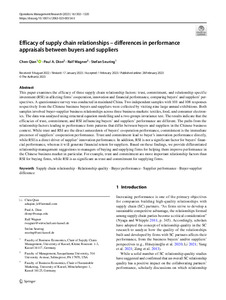| dc.date.accessioned | 2023-12-01T14:58:33Z | |
| dc.date.available | 2023-12-01T14:58:33Z | |
| dc.date.issued | 2023-02-28 | |
| dc.identifier | doi:10.17170/kobra-202311159017 | |
| dc.identifier.uri | http://hdl.handle.net/123456789/15255 | |
| dc.description.sponsorship | Gefördert im Rahmen des Projekts DEAL | ger |
| dc.language.iso | eng | |
| dc.rights | Namensnennung 4.0 International | * |
| dc.rights.uri | http://creativecommons.org/licenses/by/4.0/ | * |
| dc.subject | supply chain relationship | eng |
| dc.subject | relationship quality | eng |
| dc.subject | buyer performance | eng |
| dc.subject | supplier performance | eng |
| dc.subject | buyer-supplier difference | eng |
| dc.subject.ddc | 330 | |
| dc.title | Efficacy of supply chain relationships – differences in performance appraisals between buyers and suppliers | eng |
| dc.type | Aufsatz | |
| dcterms.abstract | This paper examines the efficacy of three supply chain relationship factors: trust, commitment, and relationship specific investment (RSI) in affecting firms’ cooperation, innovation and financial performance, comparing buyers’ and suppliers’ perspectives. A questionnaire survey was conducted in mainland China. Two independent samples with 101 and 108 responses respectively from the Chinese business buyers and suppliers were collected by visiting nine large annual exhibitions. Both samples involved buyer–supplier business relationships across three business markets: textiles, food, and consumer electronics. The data was analysed using structural equation modelling and a two-groups invariance test. The results indicate that the efficacies of trust, commitment, and RSI influencing buyers’ and suppliers’ performance are different. The paths from the relationship factors leading to performance form patterns that differ between buyers and suppliers in the Chinese business context. While trust and RSI are the direct antecedents of buyers’ cooperation performance, commitment is the immediate precursor of suppliers’ cooperation performance. Trust and commitment lead to buyer’s innovation performance directly, while RSI is a direct driver of supplier’ innovation performance. In addition, RSI is not a significant factor for buyers’ financial performance, whereas it will generate financial return for suppliers. Based on these findings, we provide differentiated relationship management suggestions to managers of buying and supplying firms for helping them improve performance in the Chinese business market in particular. For example, trust and commitment are more important relationship factors than RSI for buying firms, while RSI is as significant as trust and commitment for supplying firms. | eng |
| dcterms.accessRights | open access | |
| dcterms.creator | Qian, Chen | |
| dcterms.creator | Dion, Paul A. | |
| dcterms.creator | Wagner, Ralf | |
| dcterms.creator | Seuring, Stefan | |
| dc.relation.doi | doi:10.1007/s12063-023-00354-3 | |
| dc.subject.swd | Supply Chain Management | ger |
| dc.subject.swd | Beziehungsmanagement | ger |
| dc.subject.swd | Zulieferer | ger |
| dc.subject.swd | Abnehmer | ger |
| dc.type.version | publishedVersion | |
| dcterms.source.identifier | eissn:1936-9743 | |
| dcterms.source.issue | Issue 3 | |
| dcterms.source.journal | Operations Management Research | eng |
| dcterms.source.pageinfo | 1302-1320 | |
| dcterms.source.volume | Volume 16 | |
| kup.iskup | false | |


